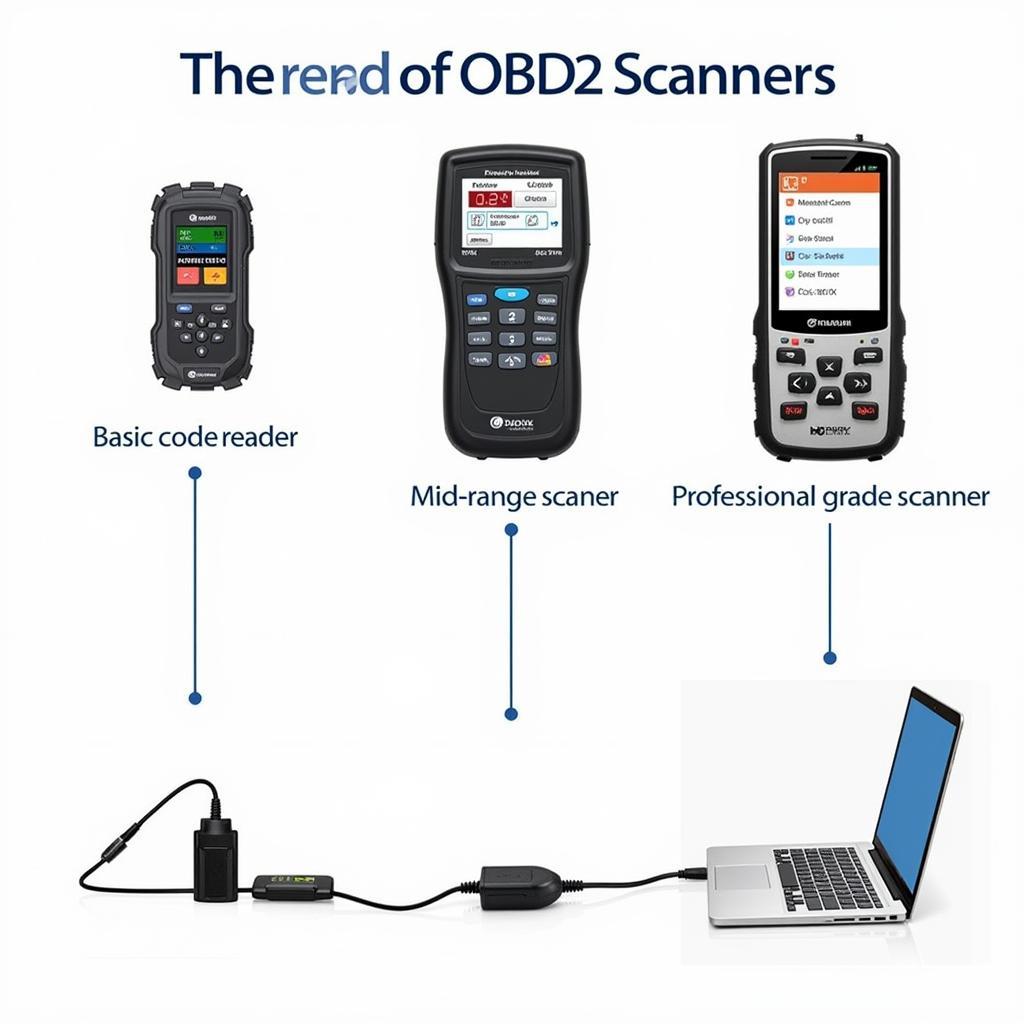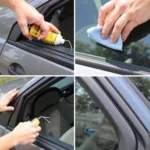Finding the best OBD diagnostic tools car for your needs can feel overwhelming. With so many options available, it’s crucial to understand what features to look for and how these tools can benefit you, whether you’re a DIY enthusiast or a professional mechanic. This guide will explore everything you need to know about OBD2 scanners, from basic code readers to advanced professional-grade systems.
If you’re looking to improve your DIY car repair skills in South Africa, check out our recommendations for the best OBD diagnostic tools for DIY car enthusiasts in South Africa. These tools can help you identify problems quickly and effectively.
Understanding OBD2 Diagnostic Tools
OBD2, or On-Board Diagnostics, is a standardized system that allows you to access your car’s computer system and retrieve diagnostic trouble codes (DTCs). These codes indicate potential issues with your vehicle, ranging from minor sensor malfunctions to more serious engine problems. OBD2 scanners, often called car diagnostic tools, act as the interface between your car’s computer and you, displaying these codes and often providing additional data.
Types of OBD2 Scanners
There are several types of OBD2 scanners available, each catering to different needs and budgets:
- Basic Code Readers: These are the most affordable options and primarily focus on retrieving and clearing DTCs. They are perfect for DIYers looking to perform simple diagnostics.
- Mid-Range Scanners: These scanners offer more advanced features, such as live data streaming, freeze frame data, and the ability to view pending codes. They are suitable for both DIYers and professional mechanics.
- Professional-Grade Scanners: These are the most sophisticated and expensive scanners, offering comprehensive diagnostic capabilities, including bi-directional control, advanced coding functions, and access to manufacturer-specific codes.
Choosing the Best OBD Diagnostic Tools Car
Selecting the right OBD2 scanner depends on your specific requirements. Consider the following factors:
- Your Budget: Prices range from under $20 for basic code readers to several thousand dollars for professional-grade systems.
- Your Skill Level: If you’re a beginner, a basic code reader might suffice. More experienced users may benefit from the advanced features of mid-range or professional-grade scanners.
- Vehicle Compatibility: Ensure the scanner is compatible with your car’s make, model, and year. Most modern vehicles use the standard OBD2 protocol, but some older models may require specific adapters.
- Features: Consider which features are essential for your needs, such as live data streaming, freeze frame data, and bi-directional control.
Need help finding the best OBD diagnostic tools for your DIY 4×4 projects? Explore our recommendations specifically tailored for the 4×4 community. These tools are designed to withstand rugged conditions and provide accurate diagnostics for off-road vehicles.
Benefits of Using OBD Diagnostic Tools Car
OBD2 scanners offer numerous benefits, including:
- Early Problem Detection: Identifying potential issues early on can prevent costly repairs down the line.
- Improved Fuel Efficiency: Diagnosing and fixing issues that affect fuel economy can save you money on gas.
- Enhanced DIY Capabilities: OBD2 scanners empower car owners to perform basic diagnostics and maintenance tasks themselves.
- Peace of Mind: Knowing you can quickly diagnose car problems can provide valuable peace of mind.
Are you looking for a car diagnostic machine in Johannesburg? We have compiled a list of reliable service providers offering car diagnostic services in Johannesburg, helping you find the right solution for your car’s needs.
Conclusion
Investing in one of the best OBD diagnostic tools car is a wise decision for any car owner. Whether you’re a DIY enthusiast or a professional mechanic, these tools can save you time, money, and frustration by providing valuable insights into your car’s health. Choosing the right scanner depends on your specific needs and budget, so take the time to research and compare different models before making a purchase.
If you’re considering getting a car diagnostic, our guide on getting a car diagnostic provides valuable information on what to expect during the process. This will help you make informed decisions about your vehicle’s maintenance.
FAQ
- What does OBD2 stand for? On-Board Diagnostics, version 2.
- Are all cars OBD2 compliant? Most cars manufactured after 1996 in the US and after 2001 in Europe are OBD2 compliant.
- Can I clear DTCs with an OBD2 scanner? Yes, most OBD2 scanners allow you to clear DTCs.
- Do I need a professional-grade scanner? Not necessarily. A basic or mid-range scanner is sufficient for most DIYers.
- What if my scanner doesn’t work? Check compatibility with your car. If still experiencing issues, contact the manufacturer.
- What are some common DTCs? P0420 (catalytic converter efficiency), P0300 (random misfire), P0171 (system too lean).
- Where can I find more information about OBD2 codes? Online resources and repair manuals provide detailed information about specific DTCs.
Considering the various noises your car might make and their potential connection to diagnostic readings? Learn more about noise sound on car diagnostics, which can help you understand the relationship between the sounds your car makes and the codes displayed by your OBD2 scanner.
For further assistance, don’t hesitate to contact us via WhatsApp: +1(641)206-8880, or Email: [email protected]. Our 24/7 customer support team is ready to help.


